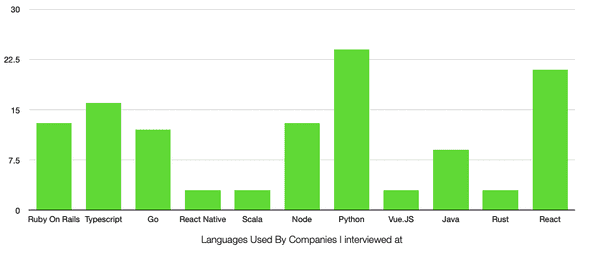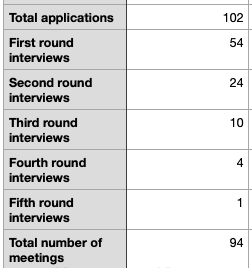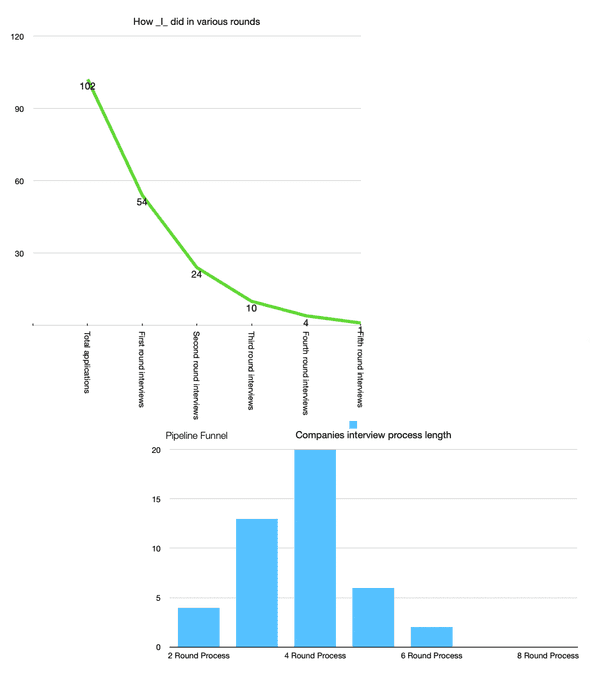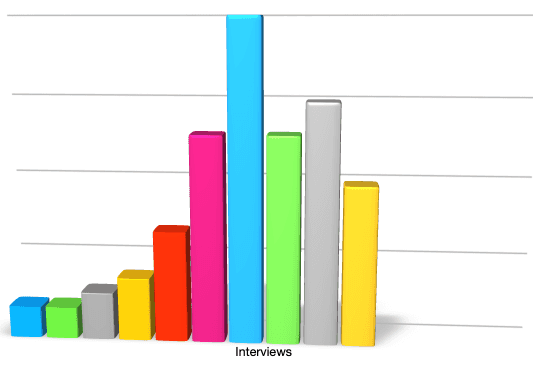Job Search 2021
January 18, 2022
Note: previously I tried to keep personal stuff off this blog, and have that be on another site. I decided to revisit that decision, and now will keep posts by Ryan in the “ryan” tag.
The Setup
Late in 2021 I got a new job! I have a blog entry about my last job search and this one will be in the spirit of that, except with different numbers.
I started my job search in March 2021, and accepted a job October 29, 2021. Like my previous search it was done quietly, without big fanfair or relying too much on my network of friends / coworkers.
It started in early March, and after talking with a few close friends and advisors about “are [these feelings] depression or a sign to move on?” I decided to ask an outside career coach. I wanted something pre-packaged: I get X, Y and Z for $B price vs a mentoring relationship.
I ended up contacting Jermaine Jupiter. Jermaine mostly specializies in helping Black people in tech, getting new jobs or leveling up their career. I’m a white cishet dude with a ton of industry experience so a bit out of his target market, so I asked, we chatted and I ended up purchasing his Starter Pack.
(This was also a great reinforcement of pricing lessons I’ve been learning over the last five years or so: sometimes you want a fixed price for a fixed set of services, perhaps bundled together in some kind of upselling deal. I didn’t want a mentor, I wanted actionable information and coaching about this one thing)
Literally the first session he confirmed a number of things I believed to be true, as actually true. (Mostly around my comp value in the industry and some growth stuff I was seeing).
Jermaine is great, every meeting he would leave me with things to do or try, and thoughts to think. It was especially great to have an outside perspective and one that knew the larger industry trends.
(As an aside, his big goal in 2021 was to get 100 Black people into tech, which he blew away with 126 people placed! I’m excited to see what he does in 2022! Here’s his LinkedIn)
Before meeting him I made a list of Things That Make Me Sad about my current job. I got advice on this list (again: depression or a sign?), and through my job hunt I kept this list updated and kept validating it with friends. The validating thing was the more I refined the list and sharing it with more and more friends the more I got, “yup, you’re right”, and very few “Ryan, you’re off the mark with that one…“.
Most of that list came down to culture (it always comes down to people, after all), but I also examined the paths open to me in the organization and if I wanted to persue those opportunties inside or outside the company. I wanted to avoid running straight into a job that would just make me sad. For example, I don’t like spending all day doing high level lines-and-diagrams and inter-buisness-unit technology alignment. I was close to a team that did that work, respect those people but also no thank you - I like being slightly closer to the ground. So I crossed jobs like that off my possibilities list.
Some Stats
I started interviewing March through May 2021, only mildly serious about it. I filtered very hard on either name, or comp, starting influence (title), or “oh that sounds like fun.”
Took a small break for the summer vacation, but started back into it - hard this time - middle of August.
During this latter time I collected stats.
Too Long, Won’t Read / Gimme the stats now
Out of 102 applications I did:
- virtual onsites: 8
- take home assignments: 5
- HackerRank / LeetCode: 4
- Pages in my meetings notebook: 113
- “Thank you for your consideration, but” emails from companies: 61
- verbal offers: 1.5
- offers: 1
The virtual onsite is a new, COVID-19, thing. Instead of missing 1 full day of work for interviews, plus maybe a day to fly to the other side of the country and back, companies now did onsites virtually. So 4-6 hours of Zoom meetings, maybe on the same day but maybe not, covering all the system design, coding, cultural fit and experience questions usually asked on campus, now virtually.
This was very convenient. The only thing I missed was the ability to check out the office situation: cubicals or not, what does the snack room look like, how distracted are the employees (or are they reading their phone while trying to interview me?). But since I was looking for a remote job, the office really doesn’t matter.
Last job hunt I was very burnt out by take-home assignments. This time around I felt like there was more reliance on HackerRank/LeetCode. I’m not sure if this is better, but at least LeetCode you are strictly timed and you’re not trying to guess what part of a fullstack+devops project to focus more on. And I say this as a person where LeetCode / Algorithms is one of my weaker areas.
For most of my search I did not actively engage many third party recruiters - if they emailed a job to me that was one thing, but only in the last 3 weeks of my search did I actively approach a recruiter and say, “What do you have for me?“. I suspect if I would have my numbers would look better, at least in this “everything’s turned up to 11” environment tech hiring is right now.
Languages used by companies
On my first or second interview I would ask about the technologies used by the company, and graphed those. Remember: this is very much a slice of the industry that also happened to give me a first or second round interview. Thus it’s likely very influenced by languages and frameworks I once used.
Funnels vs me
Most companies I interviewed with had a five round interview process which on average looked something like this:
- Recruiter interview / introduction
- Hiring manager introduction or maybe coding here
- code assesment of some kind: pair programming or a LeetCode exercise or maybe just another interview
- “virtual onsite”
- Offer extended
So, how did I do?
If we put a graph of how I did vs the number of interview stages a company has it gets interesting. Not a data science or data visualizer but it’s interesting! Bow before my awesome Photoshop skills shoving two graphs (a “How I did In various rounds” graph and a “Company interview process length” graph) together!
Also notice how 4 rounds was the most common number, with steep drop offs to either side.
End Results
The offer I took ended up being a 7 round interview process (they did some introspection midway and shuffled me into a different team, thus an additional interview over their normal process), with a calendar time of 5 weeks from application to verbal offer. This length may have been as much me as them: between a full schedule during the day and I was interviewing pretty hard at that time sometimes time between interviews would be half a week.
How hard did I interview towards the end? Here’s a graph of the interviews I did per week for the last 2 months:
I’ve left the Y axis unlabeled, but trust me: the unit is not 1. The blue bar where things start to go down? That was when I was pretty sure I was going to get a verbal offer (that I ended up taking). With interviews already scheduled a week out and my pessimistic nature (By that time I was really down in the dumps) I scheduled a-few-but-not-too-many just in case interviews. It took a while to unwind the stack, as they say.
Another interesting note: every company was interviewing and growing. I got into the habit of asking, usually in the first interview, how much the company was going to grow “in the forseeable”. I did an average and it was 211%. Now how realistic that number actually was (lol), and I think it’s a straight average, not a mean (so that one company that wanted to go from 1 engineer to 8 in the next 3 months brought the average up), but I do have the raw data in a spreadsheet.
Regardless, the market was very hot.
Thinking about moving jobs
I created a bunch of self surveys to help me understand my next move. My questions were things like:
- Where do I add value in my current job? Where can I add value in another org?
- What people helped you succeed in your current job? (Including those that have since left the company). How did they help you?
- Who are my champions?
- Roles I don’t want
- What does my world look like in 5 years? (This is not just the “where do you see yourself?” but also “what does your family situation or living situation look like, and what demands will that have time wise or financially”)
- Feelings: up and down feelings are OK, and human, but realistically are things looking up at the job? Still mostly having fun? Or is there a downhill slide that looks like it’s not going to get better? Are the things that make you sad things you or the org can or want to fix?
- Will I be happy not doing what I’m doing now?
I ended up writing about 40 pages of notes on this and similar questions
I’m considering expanding these questions and making a little PDF workbook out of them. Interested? Send me an email.



